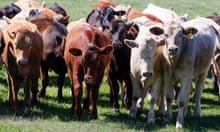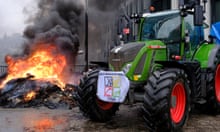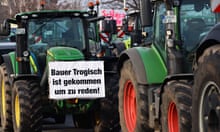Yields of key crops in Europe will be sharply down this year owing to heatwaves and droughts, exacerbating the impacts of the Ukraine war on food prices.
Maize, sunflower and soya bean yields are forecast by the EU to drop by about 8% to 9% due to hot weather across the continent. Supplies of cooking oil and maize were already under pressure, as Ukraine is a major producer and its exports have been blocked by Russia.
Large parts of Europe have been afflicted by drought and hot weather in recent weeks, including Spain, southern France, central and northern Italy, central Germany, northern Romania and eastern Hungary. Cereal yields are down about 2% overall, compared with the five-year average, though a handful of crops such as sugar beet and potatoes are doing better than average.
According to the latest monthly edition of the Mars Bulletin, published this week by the EU’s Joint Research Centre, drought and heat stress in many regions coincided with the flowering stage for key crops, and water reservoirs in many places are at levels too low to meet the demand for irrigation.
Vladimir Putin, Russia’s president, has been refusing to allow shipments of grain and other foodstuffs from Ukraine, though a fragile deal on some shipments has been reached that should enable at least some of Ukraine’s harvests to reach world markets.
The war in Ukraine has also raised prices of fuel and fertiliser, both essential inputs for farming, which has raised food prices further. Ukraine itself is also suffering the impacts of hot weather and heat stress, as well as the war, which is preventing the shipment of grain, maize, sunflower and other crops already harvested, and is likely to have a severe impact on coming harvests as farmers are unable to plant their fields properly.
Food prices have been rising across the world as a result of the Ukraine war and the aftermath of the Covid-19 pandemic – which led to people in many countries exhausting their reserves of food, as well as rising demand and the impacts of the climate crisis.










